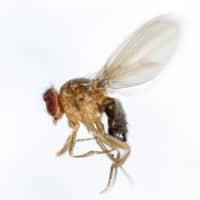A group of Japanese researchers have pinned down a way to activate autophagy, a key metabolic function in cells, leading to a slower aging process and longer life span in a non-human study.
The findings, published in the online edition of the U.K. science journal Nature Communications on Tuesday, raise hopes that the method could be applied to extend healthy human life expectancy. The research team was led by Tamotsu Yoshimori, a professor of cell biology at Osaka University.
Autophagy, a process which breaks down unwanted proteins and pathogens, is known to decline with age, according to the researchers. Their study on fruit flies and mice found that the autophagy inhibitor Rubicon, a type of protein, increases in volume with age.
When they suppressed Rubicon activity in fruit flies, also known as vinegar flies, the insects' autophagy was activated. This resulted in a 20 percent increase in average life expectancy, improvement in motor functions, and a reduction in protein accumulations conducive to neurodegenerative disease development.
The researchers also used genome editing technology to render the Rubicon in mice inactive. The amount of proteins which could cause Parkinson's disease decreased in the mammals, they reported. They said measuring the volume of Rubicon and inhibiting the protein's activities with medicine had the potential to treat age-related diseases.
Yoshimori studied under Yoshinori Osumi, an honorary professor at the Tokyo Institute of Technology, who won the Nobel Prize in 2016 for discovering the mechanism of autophagy.




